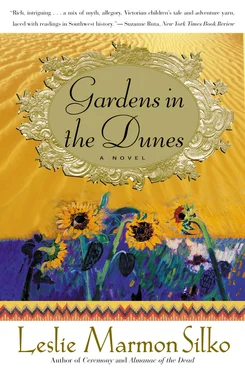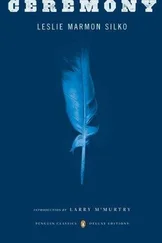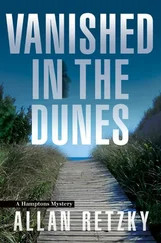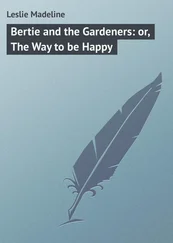They approached the edge of the big excavation, where workmen filled wheelbarrows with dirt and stone debris by the light of kerosene torches that projected strange giant shadows of the workmen on the walls. Below them, on the deepest level of the excavation, Edward saw the edge of the old Roman pool that once encompassed an area far greater even than the site of the hotel.
Major Davis left the workmen as soon as he saw them, and he and Aunt Bronwyn exchanged warm greetings. After the introductions were made, the major lit a small lantern and guided them between heaps of old stones and piles of damp earth to point out the periods of occupation: the Tudor and Elizabethan levels were hardly distinguishable from each other and appeared as dark gray streaks; the medieval level was deeper but a lighter gray; the Norman level was the color of ashes. The exposed layers of earth reminded Hattie of the alternating layers of jam and cream in a fancy cake. They descended the wide stone steps the workmen had unearthed only days before; a damp odor of clay and decaying organic material clung to the steps. Indigo was reminded of the odor of the smelly black mud she and Sister Salt tried to avoid at the edge of the river. As Hattie took a step down, the major announced she was now standing on the earliest Roman occupation level, from the time the sacred hot springs were first contained in a pool of cement and limestone; the construction of a Roman temple dedicated to Sulis Minerva followed. Its name was somewhat of a mystery, Major Davis explained, because Sulis was a Celtic deity of the sun and Minerva was the Roman goddess of the moon. He led them past piles of stone and plaster debris.
Edward noticed a number of torches lighting an area that appeared to hold something of great importance. Major Davis led them to it and stepped aside with a flourish to reveal the carved limestone altar of Sulis Minerva. All eyes were on the corner pillars of the altar — each was carved with voluptuous nude figures, two women and two men; fortunately the most prominent features of the statues were weathered enough, so Hattie allowed Indigo to step up to get a better look.
Hattie realized the altar platform stone, though larger and wider, was almost identical in shape to the flat rock in her dream and in her aunt’s garden. An odd sensation pulsed through her body when she touched the corner of the altar stone, and left her feeling a bit light-headed, but not unwell.
The parrot became extremely agitated, flapping its wings and screeching on Indigo’s shoulder; for a moment the workmen all stopped to stare, but with a stern glance from the major the work resumed. As soon as she moved away from the altar the parrot quieted; Indigo was not surprised to see Edward’s frown but she was saddened at the odd expression on Hattie’s face, as if she wanted Indigo and the parrot to leave at once.
Aunt Bronwyn took Indigo’s hand firmly in hers. The parrot was only trying to warn them the air in the basement was not fresh! The Romans made a mistake when they built structures over the hot springs. Aunt Bronwyn was more interested in the sacred springs before the invasion of the Romans, when the Celts tossed coins and tablets of lead to curse enemies to the spirits of the springs. At the mention of coins, Edward interrupted his examination of the altar platform and turned to the major and Aunt Bronwyn. Was it possible to see the artifacts that were for sale? Of course. Would they like to see the excavation where the Celtic objects were found? It was right on their way to the storage area for artifacts.
They followed the major down the wooden ramp for wheelbarrows, down into the deepest level of the excavations, where workmen removed the layers of sand and peat from the bottom of the pool. Here warm springwater bubbled up through the sand even as the workmen toiled in rubber boots.
Indigo was fascinated with the bubbling sand and water over the mouth of the spring. The spring at the old gardens dripped cool water down a cleft in the sandstone cliff; here the water bubbled straight up through the sand in a circle that Indigo watched closely for a long time until the circle of bubbling sand reminded her of the dancers bobbing and swaying as they swooned at the sight of the Messiah and his family. Then she felt Aunt Bronwyn gently touch her shoulder to ask if she was all right.
“I was remembering the dancers,” Indigo said. “When I think of them and that night, I am happy.”
It was a relief to emerge into the fresh air in the back hall of the old hotel. They followed the major to a large storage pantry used to clean and catalogue the artifacts and to label fragments of temple pediments and other carved stone. His assistants excused themselves while the major took the ring of keys to the large oak chests already packed for shipment to Oxford.
The major unwrapped a bundle of canvas and twine to reveal a dozen little wooden artifact boxes with identification labels neatly lettered in india ink. He slid back the tops of the boxes one by one to display the carved gemstones nested in cotton and set them out on the worktable; then he invited them to step closer and have a look. In the later Roman levels, little amulets of ivory and bronze in the shapes of breasts were found; fertility offerings, the major supposed. Hattie felt her face flush at the word “fertility” but hoped no one noticed.
Some were superstitious, but not the major; some thought to remove the ancient offerings to the springs invited disaster. Hattie had no desire to touch anything from centuries in black peat mud that reeked of old human waste, but Edward eagerly reached into the boxes. Indigo pressed close to Hattie to get a better look, though she was careful not to touch the carved stones. The little wooden boxes with sliding lids, lined with cotton, interested her more than the stones they contained. What good boxes for storing seeds!
Edward held up a cloudy chalcedony carved with three cattle under an oak tree; the figures of the cattle looked just like Aunt Bronwyn’s white cattle. How cruel it was to put the stones into little coffins after their centuries out in the world, even if in the bottom of a pool! The major gave a jolly chuckle at her remark and Edward joined in, but quickly cited the necessity to protect ancient artifacts for the sake of science. Aunt Bronwyn did not agree; she shook her head and turned to go just as the major dragged out a trunk with a loud noise that excited the parrot to shrieks. Indigo was relieved the major laughed before anyone could speak; he had been a parrot keeper once himself. Parrots must shriek from time to time for good health.
The major lifted a large canvas-wrapped bundle from the chest and proceeded to unwrap a thin, curved object of blackish gray metal, found by workmen in a drainage culvert. He held it up for them to get a good look; the eyes and mouth were narrow rectangular slits in the tin; the mask was of Celtic origin but was made after the Roman conquest, though its purpose was unknown. Did the mask represent the Diety of the spring? Was it worn by a priest, or a patient who came to drink the healing water?
Edward joked the mask belonged to the druids and reached out to touch it; the major handed it to him for closer inspection. Edward examined it, then lifted the tin mask up to his face for a moment and peered out the eyeholes at the others. He supposed it was self-consciousness that caused the odd sensation when he looked through the eyes of the mask; more distance seemed to lie between himself and Hattie and other people, though they did not move. He pulled the mask away and looked at them, then lifted it again and looked before he gave the mask back to the major.
The major talked as he rewrapped the tin mask. The mask showed no relation at all to the fine bronze head of Minerva unearthed in the excavations of 1792. He hoped to locate the rest of Minerva’s bronze, though now it appeared unlikely; the funds allocated for the excavations were nearly spent. The cost of running the pumps day and night to keep the excavations clear of the springwater was prohibitive.
Читать дальше












